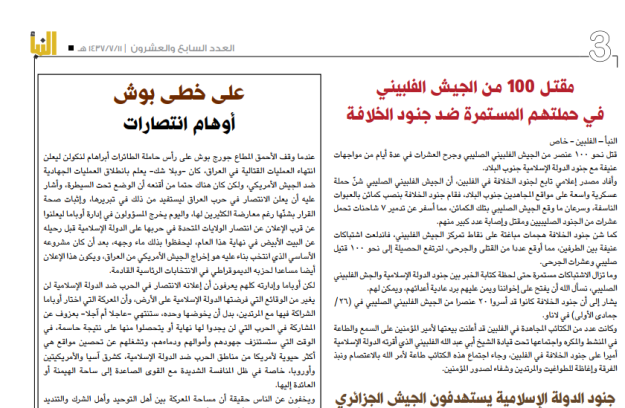By Kyle Orton (@KyleWOrton) on May 26, 2016

The Islamic State’s spokesman, Taha Falaha (Abu Muhammad al-Adnani), released a speech on 21 May that prepared the ideological ground for the loss of territory by underlining something the Islamic State has long maintained: the caliphate is more a cause than a location. This was a departure, however, from the confident messaging that the Islamic State had emphasized since it announced the caliphate in June 2014. Just a month before Falaha’s speech, on 16 April, the twenty-seventh edition of al-Naba, the Islamic State’s weekly newsletter, carried an editorial that was triumphalist about the march of the jihadists—despite the losses in the prior eight weeks, of Ramadi in early February, al-Shadadi later in February, Palmyra on 27 March, and al-Qaryatayn on 3 April. That editorial from al-Naba 27 is reproduced below.
* * * * * *
In Bush’s Footsteps Are the Illusions of Victories
When George Bush stood at the head of the aircraft carrier Abraham Lincoln to announce the end of combat operations in Iraq, he was undoubtedly aware of the launching jihadist operations against the U.S. Army, but he was convinced that the situation was under control and that he had to declare victory in the Iraq war in order to benefit from it and to prove his resolution in the face of much opposition. Today, the Obama administration’s officials come out to declare the imminent victory of the United States in its war against the Islamic State before leaving the White House at the end of this year, thus saving face after his main project was the removal of the U.S. Army from Iraq. This announcement will also help his Democratic Party in the upcoming presidential elections.
But Obama and his administration all know that declaring victory in the war against the Islamic State will not alter the facts that have been imposed on the ground by the Islamic State, and Obama’s decision to partner with the apostates [i.e. YPG/PKK], rather than fighting alone, demonstrates the Americans’ reluctance to invest in a war [against the Islamic State]. This will end without a decisive victory; their resolve, money, and blood will be drained away; and—sooner or later—they will move to fortify sites that are more vital to America than war zones against the Islamic State, such as Asia, the Americas, and Europe, especially in the face of intense competition with emerging powers.
In order to hide the fact that the area of battle between the people of tawhid [monotheism] and the people of shirk [polytheism] is far wider today than America and its allies can cover with their aircraft and army, they focus on Iraq and Syria. America is mobilizing its aircraft and army, and spending billions of dollars, in an effort to prove that the crusade is on the right track and that it is achieving the desired results …
Today, the soldiers of the caliphate—thanks be to god—have spread out across the continents of Asia and Africa, and explored the depths of Europe, with their eyes on America, watching for any gap among their enemies that can be exploited, to gain strength in that part of the earth and [ultimately] annex it to Dar al-Islam [the Abode of Islam]. The stories of the heroism by our brothers in Yemen, the Arabian Peninsula, Sinai, the Libyan and Algerian wilayats [provinces], East and West Africa, the Caucasus, Khorasan, and the Philippines are never far from us. Every jihadi front in these areas is ready to transform into what Iraq and the Levant are today, with the establishment of religious rule and tawhid, by God’s will.
At the same time, the withdrawal of the caliphate’s soldiers from areas of land in Iraq and Syria … does not in any way mean that their enemies on the ground—the apostates, Nasserites, the Kurds, and the Sahwa—have become stronger and more powerful than they are. In fact, they are in a state of extreme weakness and, despite thousands of airstrikes, they have not been able to achieve decisive victories against the caliphate’s army. America’s pledge to drop thousands more soldiers in to support them [the SDF/PKK] is a new proof of their weakness and inability to resolve the battle on their own. Therefore, the Islamic State will retake the initiative under any circumstances where there is a decline in American support, God willing.
America and its allies today are struggling to expand their support for apostates, including in the state of Tripoli, as is often reported, but can they extend support in other ways? This is questionable, and the scope for doubt increases with the expansion of the Islamic State on the battlefield, and the increasing capabilities of its soldiers and commanders to achieve breakthroughs deep within the Crusader states, which will lead them to prefer to enhance their domestic fronts, rather than to venture overseas.
The victory that Obama is looking for today is less valuable than the victory claimed by Bush, and, though they boast about killing the leaders of the Islamic State today, it will achieve even less than what was achieved by them killing Shaykh Abu Musab al-Zarqawi, and the Shaykh after him, and their brothers, may God have mercy on them. They should learn the lesson of experience, and save themselves the grief and its costs.
* * * * * *
UPDATE: The new tone inaugurated by Falaha was continued in al-Naba 34, published on 4 June, which contained an editorial that made a similar case for disregarding the holding of territory as a measure of success.
Pingback: The Islamic State Says the Loss of the Caliphate Does Not Mean Defeat | The Syrian Intifada
Pingback: Islamic State Newsletter Tells the Story of Transition Between Statehood and Insurgency | The Syrian Intifada